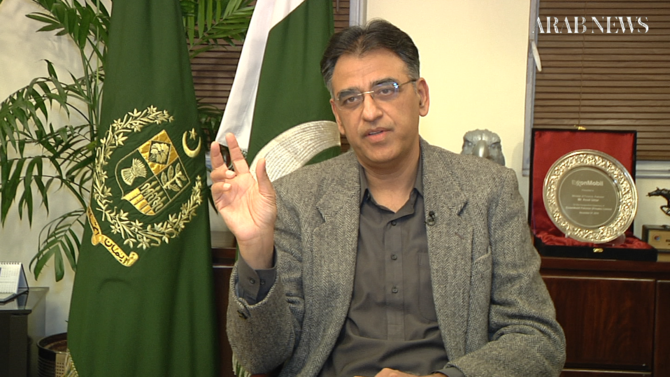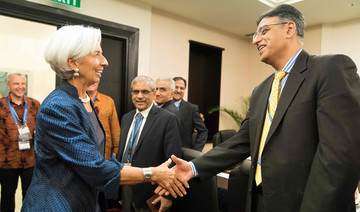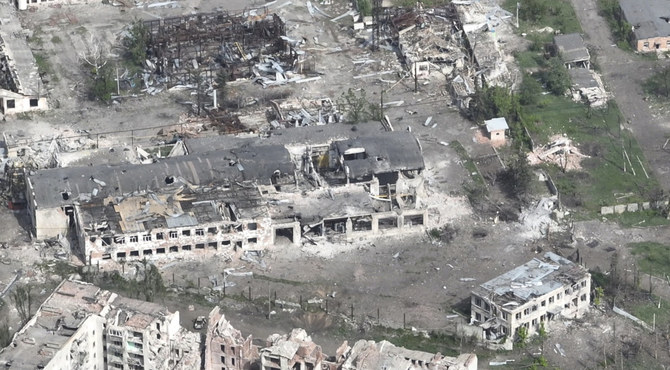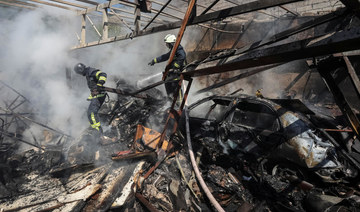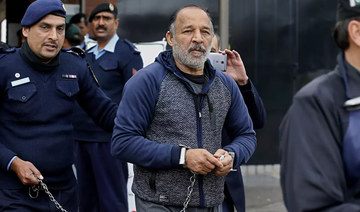ISLAMABAD: Pakistan is in no rush to strike a deal with the International Monetary Fund to deal with its balance-of-payments crisis, Finance Minister Asad Umar has told Arab News. He added that funding from “friendly countries” would help shore up the economy over the remainder of the current financial year.
Pakistani officials have been in talks with the IMF since October, and have formally requested Islamabad’s 13th bailout since the late 1980s to help settle the economy while the new government of Prime Minister Imran Khan, who came to power in July, struggles to implement reforms.
“I have no urgency right now to get into an IMF program,” Umar told Arab News in a wide-ranging interview on Thursday. “We are in discussions (with the IMF). When we reach the (outlines) of a program which we believe is in the best interests of Pakistan’s economy, we’ll go ahead and sign that.”
Umar said that pressure to rush a deal with the IMF through had eased, thanks to a combination of bilateral financial support from historical allies and a host of economic measures taken by the government in its first hundred days in power, which he claimed would result in a current account deficit of $6-7 billion less than the previous financial year.
“So I’ve saved $6-7 billion of my financing need and then I’ve arranged funding from bilateral sources to bridge the gap,” Umar said, referring to a $6 billion package agreed on with Saudi Arabia this October and expected aid from China and the UAE.
Umar refused to provide a figure for packages promised by the latter two countries, but said that, in both cases, it was just a case of “dotting the i’s and crossing the t’s” on the agreements.
Injections from allies will provide a much-needed boost to Pakistan’s foreign exchange reserves, which dipped to their lowest in over 4 years — at $7.3 billion — in the week that ended on Dec. 7.
Any IMF program will likely require Pakistan to commit to strict structural reforms to the economy, and to curbing the government spending that has seen growth soar to nearly 6 percent — at the fastest rate in 13 years — but has also exhausted budgets.
In October, the IMF predicted Pakistan’s growth will slow to four percent in 2019 and about 3 percent in the medium term. This month, the Pakistani rupee dropped to an all-time low of 0.0144 against the dollar.
Umar denied that the government had allowed the rupee’s value to drop in order to fulfill a precondition of an IMF bailout. He said the main sticking point in negotiations with the organization was the pace of reforms.
“We believe that if you try and make reforms too quickly, if you try and make an adjustment too quickly, you’ll crash the economy,” the minister said. “And that is not in our interests, not even from a debt-sustainability point of view.”
The IMF has also said it wants “absolute transparency” regarding Pakistan’s debts — a demand that will require clarification of certain opaque deals, as well as its debts to China for some $60 billion in financing for energy and infrastructure projects that are part of Beijing’s Belt and Road Initiative.
Asked whether reviewing agreements related to the China-Pakistan Economic Corridor (CPEC) program was off the table, the finance minister said: “Not at all.”
“If it’s (a question of) transparency, then transparency is available,” he said, stressing that contracts with China had been signed in accordance with “well-established rules.”
Umar also noted that Pakistan had satisfied all concerns raised by the IMF and US officials with regard to CPEC.
“The IMF had a lot of questions. The Americans had a lot of questions around CPEC,” he said. “We made a presentation, we shared the data with them — first meeting. They never came back after that.”
Umar said new projects slated to be added to the CPEC portfolio included a railway line from the port city of Karachi to the northwestern town of Peshawar, and the establishment of special industrial zones.
“There are a few other projects in the area of the industrial cooperation framework that is being finalized, and which will lay the basis on which future industrial cooperation will take place, private sector-to-private sector,” Umar said. “So, from government-to-government, which is what the first phase of CPEC was, it will be moving to business-to-business.”
Giving details of the Saudi package of $3 billion in foreign currency support for a year and a further loan of up to $3 billion in deferred payments for oil imports, the finance minister said $1 billion of the $6 billion package had been disbursed so far.
“It’s not a rescue package, it’s a financing package,” he said. “Saudi Arabia will earn a rate of return on that investment.”
Umar explained that the pending agreements with China and the UAE were also not aid packages: “These are all financial transactions. There are loans, there are trade finance facilities. Pakistan is not taking aid from anyone.”
Referring to a recent World Bank report that said trade between India and Pakistan was far below its potential of $37 billion, the minister said Pakistan was ready to engage in a constructive trade dialogue with its neighbor but “it can’t be a one-sided relationship.”
Trade has long been tied to political conflict between the hostile neighbors who have fought three wars since independence from Britain in 1947. Peaceniks on both sides say progress in trade ties could help bolster a fragile peace process.
But Umar ruled out any discussions on trade with India before general elections there in 2019 and said Pakistan would not take “any kind of unilateral step” when it came to granting India Most Favoured Nation (MFN) trade status, a proposal that past governments have toyed with.
On the government’s promise of attracting investment from Pakistanis living abroad, the finance minister said rules for a diaspora bond were approved by the Cabinet a week ago and the bond would be issued late December or January.
“There are equity-related or investment opportunity-related diaspora investments which are being finalized. The board of investment has worked on them; there was a presentation to the prime minister today (Thursday) about some of those,” Umar said. “First the diaspora bonds will be launched and then these initiatives will follow quickly after.”
The minister said despite “doom-and-gloom” scenarios painted by critics, he owed his optimism about Pakistan’s future to the fact that he was a “data-driven person.”
“I’m sure you would have heard (people say), ‘Business is not investing (in Pakistan) anymore,’” Umar said. “But if you look at private sector credit offtake — a useful metric to measure business investment — it was five times more in the first quarter of this year than in the first quarter of last year.
“So where is this business which is not (investing)?” he continued. “I’ve got a whole host of businesses which are coming in, international businesses coming in, all saying we want to invest hundreds of billions in Pakistan.”


